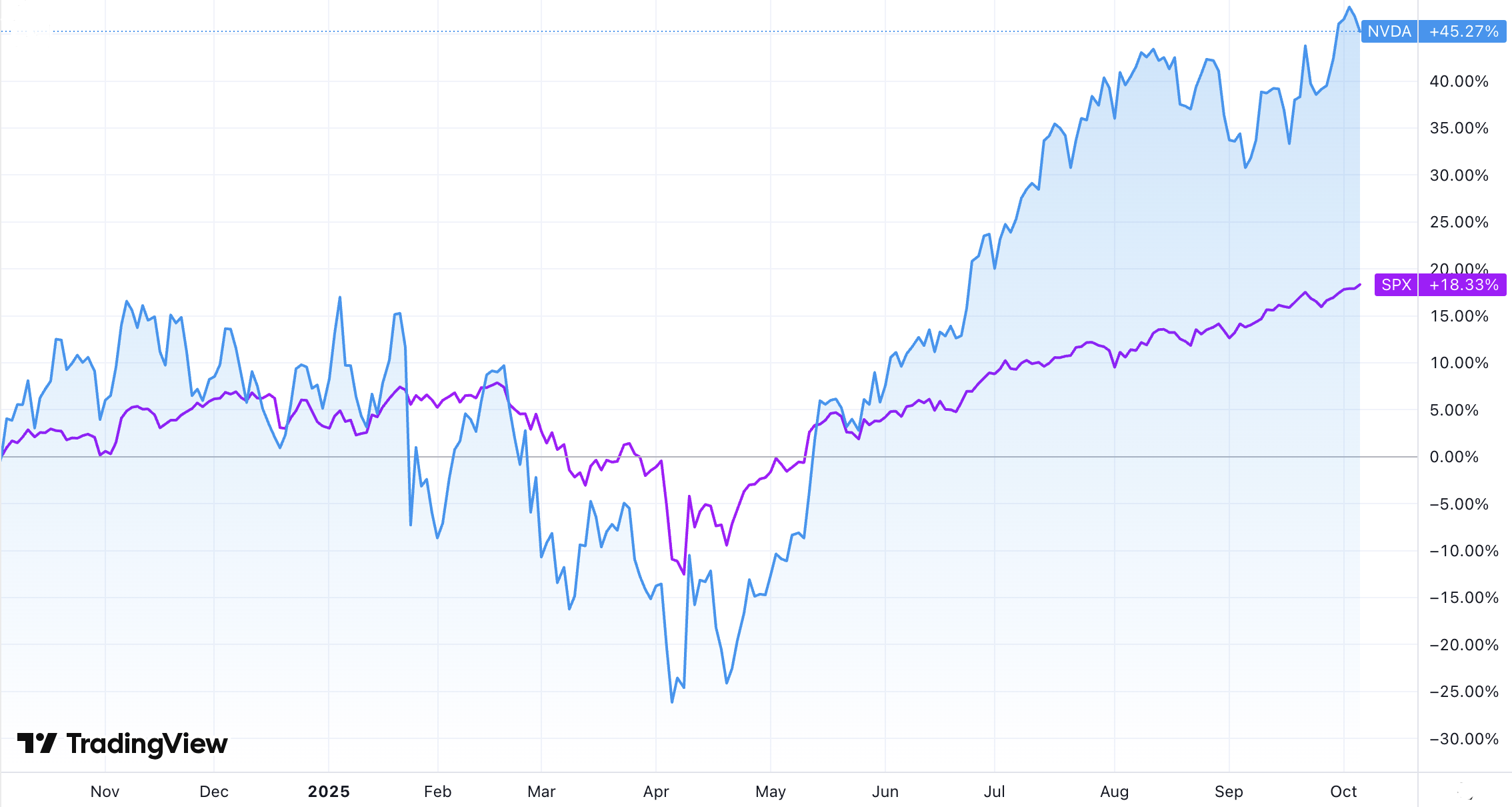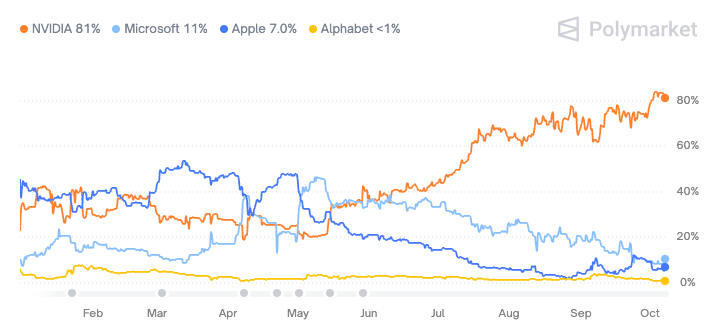This stock will be the world's biggest by the end of 2025, according to betting markets
Any investment is a gamble in some sense of the word. You're risking money on a future outcome based on your assessment of its likelihood.
But what if you could directly bet on specific outcomes for the stock market, each with its own market-driven odds?
And what could those odds tell us, if anything, about the market itself?
Taking a punt
Say you wanted to make an indirect bet on the success of certain Mag 7 stocks without having to take a directional stance either way?
Can Nvidia continue to outpace the market?

Maybe you think Apple will outperform the other Mag 7 stocks over the next few months, whether the stock market continues to rally to new all-time highs or corrects from its current lofty heights.
While it's probably possible to build a delta neutral portfolio to capture that thesis, it's arguably a lot easier to make a single bet on which company will have the largest market cap by the end of 2025.
On prediction sites like Polymarket, that's now possible.
And as it stands, Nvidia has an 82% chance of maintaining its status as the world's most valuable company at the end of the year. Microsoft is second, with an 11% chance, with Apple third on 7%.
While it's impossible to know the credentials of those placing bets (or the actual number of participants) it could be a useful gauge for how the market is assessing Nvidia's current dominance.
What will be the world's most valuable company in 2025?

Anyone betting $100 on Apple having the largest market cap by the end of 2025 would currently be in line to make $1,150 if that eventuality comes to pass.
More than US$5 million has been placed on this particular market, with some speculators in line to make serious money if the outcome goes their way.
Power to the people
Polymarket, along with competitors like Kalshi and Predictit, are decentralised prediction markets where effectively anyone can create a betting market on whatever they want.
Say you wanted to place a bet on how many times Elon Musk will post on X over the next week.
There's a prediction market for that.
Or say you want to bet on whether Taylor Swift will get pregnant in 2025.
There's a prediction market for that. (It's a 10% chance currently, according to Polymarket).
Any user can create a betting market, and then it's up to other market participants to place bets using US dollars or dollar-denominated cryptocurrencies.
The odds then change in realtime based on the bets placed by other market participants.
By removing the middle man, in this case, centralised bookmakers, it should in theory produce a more democratic and "objective" odds market.
Of course, it should go without saying that this is still gambling.
It also doesn't mean prediction markets aren't open to manipulation, especially on markets with little volume or few active bettors.
Polymarket received a lot of attention (and controversy) during the 2024 US election when it saw more than US$3 billion placed on the outcome of the presidential race.
While the polls and poll aggregators showed Kamala Harris as the favourite, Polymarket and other decentralised prediction markets gave Donald Trump the edge in the lead up to the November election.
It predictably drew accusations of manipulation, with an internal investigation finding one trader accounted for much of the money placed on a Trump victory using four different accounts, but no evidence of market manipulation. That trader ended up winning US$85 million after Trump won the election.
A brave new world for investors?
Michael Burry famously made millions betting against the US economy because of the subprime mortgage crisis, but such bets are generally beyond the means of regular investors.
Prediction markets could change that.
Instead of having to deal with complicated financial instruments in order to take a position on more esoteric asset classes, investors can now make binary bets on the same things.
Take gold as an example.
The precious metal has enjoyed a historic run over the last year or two, and is now on the cusp of hitting US$4,000 for the first time in history.
It now has a 96.3% chance of ending the year above US$3,200, according to a Polymarket prediction market with more than US$1 million in volume.
Anyone particularly bearish on gold right now could turn $100 into more than $1,500 if the price of gold ends the year below US$3,200.
For many, that might be easier than taking a short position in gold via derivatives markets.
It's the same story for interest rates.
Many financial markets move based on the decisions of key central banking bodies, but it's hard for retail investors to take a direct position on the outcome of any one rate decision.
Prediction markets let you do exactly that.
According to the Polymarket prediction market, there's a 90% chance of a 25 basis point cut when the Fed meet at the end of October, with roughly an 8% chance of no cut.
By comparison, CME's FedWatch puts a 25 bps cut at a 92.5% chance, with no change at 7.5%.
You can also bet on everything from US gas prices to Brazilian inflation to whether OpenAI announces an IPO by a certain date.
It's a brave new world for speculators and traders who think they have an edge on predicting the next big moves and developments in markets.
It's finally possible to put your money where your mouth is on a whole range of investments.
Despite its relative infancy, it's possible to foresee a world in which prediction markets start to attract serious volume in the coming years, and even influence the market itself.
Editor's note: In fact, a day after first writing this piece, Intercontinental Exchange (NYSE: ICE), owner of the NYSE, announced it was investing up to US$2 billion in Polymarket.
3 topics
1 stock mentioned

